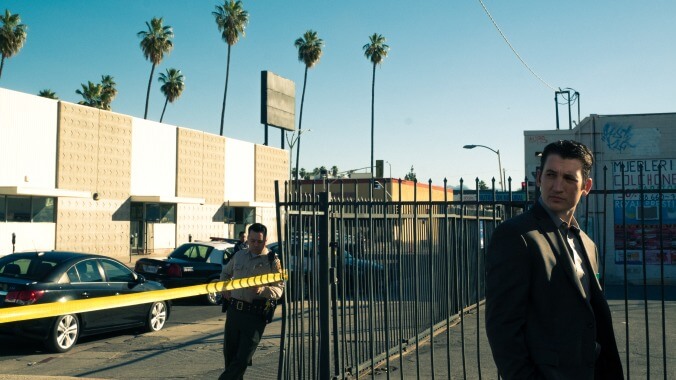How the hell do you review a TV show you've only seen the 4th and 5th episodes of?


I know more about Too Old To Die Young’s plot from reading the press materials Amazon distributed than I got from watching nearly 150 minutes of it. The usual question a critic gets—“Should I start watching this TV show?”—is a lot harder to answer when you haven’t seen the first three-plus hours of it, either. I can tell you about the fourth and fifth episodes of the new 10-part noir thriller, however, because that’s all Amazon released in advance of the show’s arrival on its streaming service June 14.
These two episodes were the only ones chosen to be screened last month at the Cannes Film Festival by writer-director Nicolas Winding Refn, the provocative auteur of films like Drive, The Pusher Trilogy, and The Neon Demon. At least a couple of people who attended that screening came away with the impression that the odd choice of mid-series episodes is because the show was created in such a way that you could theoretically watch them in any order; having watched these two, that doesn’t strike me as remotely true, and Refn himself doesn’t seem to think so, stressing that he “wanted to do one long movie,” in which the pacing very deliberately increases from the beginning to the end, “so that gradually over the 13 hours it would just build and build.”
The fourth episode sets up the fifth—a mostly self-contained mini-movie that stands apart from the broader narrative while still delivering a condensed version of the same. And judging by the painstakingly slow observations of sexuality and violence contained in both (one mostly incoherent, the other blood simple), there’s a good chance the rest of the series follows suit, unsurprising given these themes have been obsessions of Refn’s work throughout his career. So what do the fourth and fifth hours (hours-plus, really: most of the episodes are closer to 75-90 minutes) have to say about the series that surrounds them? A lot and a little: a lot, because the style, for Refn, is almost everything; and a little, because narratively, who the hell knows exactly what is going on.
Miles Teller stars as L.A. detective Martin Jones (to be honest, I thought his name was Mike until the press materials informed me otherwise, and he spends the entire fifth episode calling himself something else altogether), a cop who apparently moonlights as an avenging angel of retribution on those he sees as embodying the worst of humanity. After a languid but erotically charged opening, we see him kill a random guy, then spend the first of these two episodes looking for another bad guy to murder. He takes his cues from John Hawkes’ Viggo, a vigilante killer who delivers a portentous monologue about how humanity is falling apart (“Soon our cities will be washed away…buried…burned to the ground”), and it needs people around to “protect innocence.”
It’s unclear whether Martin sees himself in that light (it’s unclear what Martin thinks about anything, really; the script gives him very little inner life, a sentient Rorschach test that makes Ryan Gosling’s taciturn weirdo in Drive seem positively animated by comparison), but he wants to hurt bad people. And Viggo’s mystic of a boss, played by Jena Malone, thinks Martin’ll make a good fit in their sorta-hitmen operation. We do get a vague sense of his ethics: After being dispatched to kill a guy for unknown reasons, Martin spares the target’s life upon learning his only crime was being in debt, to the criminal who ordered the hit, for a whopping…eight grand. Martin will kill you, but not for being tardy on your bills, it seems.
So he asks for a new target, which leads to the entirety of episode five, a self-contained narrative that makes much more sense as to why Refn selected it to give viewers the flavor of his show. In it, Martin heads to Albuquerque, N.M. to take out a pair of brothers who traffic in extreme, violent porn—and not of the consensual kind. Following the siblings, he eventually pretends to befriend them in a bar, gets them to lead him back to their warehouse, and a violent showdown ensues, leading to an all-night car chase ending in the middle of the desert. The conclusion sees him freeing an anonymous girl who had been buried alive, only for her to stab him and run off into the horizon, with no indication who she is or why she was there. Roll credits.
Too Old To Die Young’s most obvious point of comparison is David Lynch’s recent Twin Peaks revival, and not just because that’s another story which essentially unfolds in continuous, dreamlike sequencing. Like Lynch, Refn is a master of framing, someone whose devotion to painterly composition in his shots means countless individual scenes are gorgeously staged and lit. (Working here with master cinematographer Darius Khondji, not to mention gonzo production designer Tom Foden, certainly doesn’t hurt matters.) And like that hypnotic series, the pace is glacial. Anyone who found themselves slightly impatient at the longer wordless stretches of Refn’s past work will be driven to distraction at the inertia on display here.
But unlike Lynch, there’s no warmth or humanism to break up the endless wallowing in the despairing nihilism of Refn’s perspective. Too Old To Die Young was cowritten with comics maestro (and Westworld writer) Ed Brubaker, and you can see how some of this scuzzy noir mysticism would play very differently if given a little kinetic pop in the editing. (The fourth episode offers up tantalizing snippets of subplots involving Malone’s warped seer and Nell Tiger Free as a precocious high schooler, both of which could possibly be intriguing given some explanation the earlier episodes may or may not provide.) But that’s of no interest to Refn, who never met a moment he couldn’t stretch out into near-Euclidean eternity. When restrained to the running time of your average film, this can pay wonderful dividends; even within the span of only two installments of a ten-episode series, it sometimes felt arduous, as though Only God Forgives had been pulled like taffy into an ongoing line, then sprinkled with a heavier dust of sleaze.
Even during the rare moments when characters offer up small reveals of their personalities, the lack of earlier episodes renders any efforts at knowing these people an incomprehensible hash. When he cozies up to one of the sinister porn siblings (a very creepy James Urbaniak), Martin lies about his name, but then seems to open up about real difficulties he’s having with his girlfriend—and lets drop that she’s 16. We saw this girl in the previous episode, and while she seemed to be a high school senior, who knows? Is this true? Does Martin have a disturbing propensity for underage girls? Don’t ask me! That would require letting us in on the start of this story. As is, a man who’s mostly a cypher remains even more so, thwarting efforts at injecting some character-driven tension into these scenes. The fifth episode at least offers a clear-cut beginning, middle, and end, even if it may as well have been staged with cardboard cutouts of people, for all we learn about any of them.
Tawdry and crass even by Refn’s standards, the story doesn’t give you much to hook into. At times it tries for the absurdist hyperrealism of Lynch—at a morning meeting of the sheriff’s department, Martin sits in silence as his boss leads everyone in a chant of “Fascism!”, then busts out a ukulele—but the camera views all these people with distaste, negating any interest generated by the distancing effect of its funhouse-mirror reality. There’s a lot of interesting potential around the edges of these characters and this world, but it’s impossible to say whether the groundwork has been laid in the three prior episodes to justify these scenes. He seems to be saying something about sexuality and violence and the way those boundaries become all-too-distressingly permeable at times, but it’s unfair to claim anything from such an arbitrary excerpt.
That’s what makes assessing this project such an exasperating task. Could Amazon have put its check-signing foot down and asked Refn to release the first few episodes—or better yet, the whole first half of the series, if the director really wanted us to get to the fifth episode? Hell, if it’s really one long movie broken up into chapters, as its idiosyncratic creator insists, why not let us review the whole film, rather than doing the equivalent of showing us half of the middle act and then going, “Eh?” But from what’s on display here, Too Old To Die Young is pure, uncut Refn, his passions allowed to roam freely over an enormous and time-consuming canvas that may or may not be required to do his vision justice. We won’t know if it’s self-indulgent bloat or epic storytelling until the whole thing appears—but based on Refn’s history, there’s a good chance it’ll be a hearty dose of both.